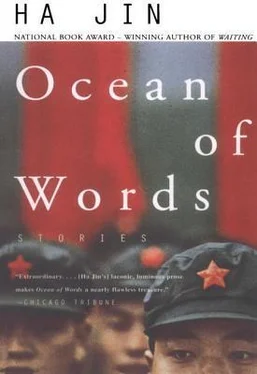“Look at it this way.” I smiled. “In a person’s life, what part is longer — war or peace?”
“Of course peace is longer.”
“Then you need a skill and some knowledge to live in peace. When you’re old, do you think you can make a living by carrying a gun like I’m doing now?”
“No, I don’t think so.”
“Then you should go, must go.”
He nodded his head. We turned around and were about to go down the hill. Niu stopped and said, “Commander Gao, I want to tell you something that I don’t know if I should.”
“What? Tell me.”
“Commissar Diao said he had you sent to Longmen.”
“What did he tell you exactly?”
“He didn’t tell me anything. After the villagers left, I overheard him on the phone: ‘Fortunately, we sent Gao Ping away beforehand.” ’
“Oh, I understand it now.” I was surprised, as the series of events started linking together. We began going down the hill. Now the whole thing became clear in my mind. By ordering me to go to Longmen, the Regimental Political Department had intended to prevent me from interfering with Dragon Head’s case; at last, I figured out why among the officers in the study program I was the only battalion leader; the others all had a higher rank. I had not been trusted. Why? Why did Diao treat me as his rival?
Suddenly it dawned on me that Diao Shu was determined to get rid of me, because I happened to know the true history of his family. Anyone with that knowledge could turn him in at any time, so I accidentally became a time bomb in his political and military career. For his own survival, he had to remove me, and the first step to achieve this purpose was to make me appear untrustworthy to our superiors so that nobody would believe what I said. He must have been working on this scheme for quite a while. Undoubtedly, the regimental leaders had already taken me for a troublemaker.
As Chief Liu had revealed to me, three months later I was demobilized.
5
Seven years have elapsed since I left the army. Life has been awfully kind to me. For all these years, I have worked as the chief of the Military Department in our commune. One of my children has gone to college in Tianjin, and the other is doing well in the middle school. In the evenings, I can have a few cups of liquor and chat away with friends till midnight. What else should I ask from life?
Diao Shu is the director of the Political Department of the Third Division now. He is an able man and probably deserves his series of promotions. Niu Hsi, who is still a lad in my eyes, returned to Hutou after graduation and has served as an interpreter in our Fifth Regiment for three years. Last month I received a letter from him. The letter reads as follows:
My Most Respected Commander Gao:
Please forgive me for my delay in writing to you. How are you now? How are your wife and children?
Recently I have been terribly busy, for the border is open now. Sometimes I work twelve hours a day. There are so many trade delegations, tourists, and business people that Russian interpreters are in great demand. Many of the local companies and factories turn to me for help when they have business to do with the Russians. Hutou is a peaceful town now — a city, I should say. You can see Russian travelers and shoppers in the streets every day, since there is a daily bus service across the border. Though I’m busy, I won’t complain. I have made a lot of money and got nine pairs of leather shoes and two dozen Western suits for free. In fact, I’m thinking of leaving the army now. There’s no need to worry about a job. Last month, Harbin Normal College contacted me and asked me if I would like to teach Russian in their school.
Dear Commander Gao, how grateful I am to you! Seven years ago, when you wanted me to go to college, I hesitated. It was you who made the decision for me. My family and I will never forget you — our great benefactor.
Here’s a small incident, which I think you may be interested in: Last month I accompanied a delegation of our division to Russia to celebrate their Army Day. Vice Divisional Commissar Huang Hsing led the group (you may not know him; he is from the Second Regiment). After the banquet, we had coffee and tea and chatted. Commissar Huang took an envelope from his briefcase and handed it to the Russian officers. Guess what was inside the envelope? A bunch of photographs of Dragon Head! While the Russians were looking at the pictures, Huang explained, “He is the bandit who sank one of your gunboats seven years ago. It was a little unpleasant episode indeed, but we had him executed long ago.” I interpreted his words, and the Russians were delighted. Among the photographs there was one showing Dragon Head’s blasted face — his forehead was gone. In fact, only I knew that the bandit had been a militia company commander called Dragon Head, but I didn’t say anything.
Commander Gao, let my pen stop here for the moment. I will write to you again when I have time.
Please give my regards to your family. May you have good health.
My Salute,
A Soldier of Yours
Niu Hsi
March 29, Hutou
Niu’s letter has made me think a lot about Dragon Head recently. He was a grand fighter, a dragon in Hutou County. He should have fallen on a battlefield.
Since the new soldiers came to my squad in February, Gu Gong had never stopped bullying them. Though it was an unstated rule that an older soldier could demand small services from a new soldier, Gu went too far — he would have the two boys wash his bowls and clothes, take his mail to the post office, and even fetch water for him in the morning, as if they had been his orderlies. The new soldiers complained to me twice, and I promised them that I would talk Gu out of his lording over the new comrades, but I didn’t have a chance to speak to him before I found myself resorting to force.
It happened one night in early April. After studying the documents issued by the Central Committee on the Ninth Chinese Communist Party Congress, we were preparing to go to bed. Some men went to the washroom down the hall to bathe their feet, while others were taking off their clothes and spreading their quilts.
“Feng Dong,” Gu said from the top of the bunk bed, “you forgot to dump the water in my basin.”
Sitting beneath Gu, Feng didn’t reply and kept unlacing his boots. I hung my hat on a hook on the wall and turned to Gu, who lay on his bed smoking.
“Feng Dong, you bastard of a new soldier.” Gu’s body jerked up. “Why don’t you dump the water?”
“I’ve never looked after my grandfather that way,” Feng said, as if to himself.
“I am your great-grandpa in this squad!”
“Stop it, Gu Gong,” I said. “You’ve gone too far. It’s unreasonable to ask others to dump the water you washed your own feet with.”
“Oh yeah? I want him to get rid of the water, or somebody will step on it going out to the latrine at night.”
“Then it’s your duty to dispose of it.”
Gu’s face turned red. “Who are you, Cheng Zhi? A big squad leader? So what? Do you think you’re an officer? How big are you anyway? As big as one of my balls?”
The men around laughed. Enraged, I went up to Gu and pulled him off his bed, together with his quilt and sheet. He fell on the cement floor. Before he could get up, I gave him a kick in the jaw. He jumped to his feet and scuffled toward me, but a few pairs of hands restrained him.
“You beat me,” he yelled. “You, a squad leader, beat your soldier.” He was struggling to get loose. “Let me go! Let me settle it with him!”
Without a word I walked to the door. I thought it was better for me to stay out of this mess for a moment.
Читать дальше











